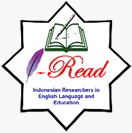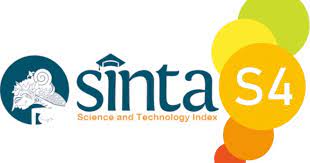Pre-Service English Teachers’ Pedagogical Competence in Teaching English: A Case of Teaching Internship Program (TIP)
DOI:
https://doi.org/10.22219/englie.v3i1.19382Keywords:
Case study, pedagogical competence, pre-service English teachers (PETs), student-teacher, teaching internship program (TIP)Abstract
Pre-service English teachers (here: PETs) play a critical role in the development of students’ academic knowledge, technical skills, social values, and individual personalities, as well as their ability to digest teaching materials properly. Considering what is known as the pedagogical competence of pre-service English teachers is an important part of this process. This study aimed at evaluating the pre-service English teachers’ pedagogical competence in the classroom while instructing pupils in the English language. This study employed a qualitative research approach, especially a case study method with five Indonesian pre-service English teachers who participated in a teaching internship program (TIP) to collect information. The researchers used a range of approaches to acquire information from the perspectives of the student-teachers. These methods included questionnaires, observations, and observation notes. During the data analysis phase, the researchers used data reduction, data visualization, conclusion writing, and verification to help them make sense of their findings. In addition, the triangulation procedure was used to examine and validate the information gathered from the participants throughout the research phase of the investigation. According to the results of this research, pre-service English teachers' pedagogical competence was good, with an average score of 3.33 out of 5 on the pedagogical competence score (67 percent). Pre-service English teachers will benefit from reflection-based instruction and extended teaching practice under the supervision of experienced instructors in English Language Teaching (ELT) practices.
Downloads
References
Adnyani, D. P. D. P. (2015). Professional development for pre-service teacher : A case study of professional development program for pre-service teacher in state university in central Indonesia. http://www.diva-portal.org/smash/record.jsf?pid=diva2%3A815811&dswid=-5860
Alghasab, M. (2015). Student-student collaboration in wiki mediated collaborative writing activities: Exploring EFL teachers’ roles in the collaborative process (Issue October) [University of York Education]. https://doi.org/10.1016/j.jbusres.2006.06.003
Avalos, B. (2011). Teacher professional development in teaching and teacher education over ten years. Teaching and Teacher Education, 27, 10–20. https://www.sciencedirect.com/science/article/pii/S0742051X10001435
Bloor, M., & Wood, F. (2016). Purposive sampling. Keywords in Qualitative Methods. https://methods.sagepub.com/base/download/BookChapter/keywords-in-qualitative-methods/n73.xml
Burleson, B. R., & Samter, W. (1990). Effects of cognitive complexity on the perceived importance of communication skills in friends. Communication Research. https://doi.org/10.1177/009365090017002002
Cho, S., Lee, H. J., & Herner-Patnode, L. (2020). Factors influencing preservice teachers’ self-efficacy in addressing cultural and linguistic needs of diverse learners. Teacher Educator, 55(4), 411–429. https://doi.org/10.1080/08878730.2020.1805835
Creswell, J. W. (2012). Educational research: Planning, conducting and evaluating quantitative and qualitative research (4th ed.). Pearson Education Inc.
Darling-Hammond, L., Wei, R., & Johnson, C. M. (2009). Teacher preparation and teacher learning: A changing policy landscape. Handbook of Education Policy Research.
DeLuca, C., Chavez, T., Bellara, A., & Cao, C. (2013). Pedagogies for preservice assessment education: Supporting teacher candidates’ assessment literacy development. Teacher Educator, 48(2), 128–142. https://doi.org/10.1080/08878730.2012.760024
Denzin, N. K., & Lincoln, Y. S. (2005). The sage handbook of qualitative research (3rd Ed). Sage Publications.
Doering, A., & Beach, R. (2002). Preservice English teachers acquiring literacy practices through technology tools. Language Learning and Technology, 6(3), 127–146.
Downing, J. J., & Dyment, J. E. (2013). Teacher educators’ readiness, preparation, and perceptions of preparing preservice teachers in a fully online environment: An exploratory study. Teacher Educator, 48(2), 96–109. https://doi.org/10.1080/08878730.2012.760023
Eggen, P., & Kauchak, D. (2001). Educational psychology: Windows on classrooms. 8th. Upper Saddle River, NJ: Pearson.
Johnson, R. B., & Christensen, L. (2019). Educational research: Quantitative, qualitative, and mixed approaches. Sage publications.
Kihlgren, P. (2016). Do we need validity?–A critical appraisal of validity in qualitative research. lup.lub.lu.se. https://lup.lub.lu.se/student-papers/record/8886747
Köksal, N., & Çöğmen, S. (2013). Pre-service teachers as lifelong learners: University facilities for promoting their professional development. Eurasian Journal of Educational Research, 53, 21–40. https://doi.org/10.14689/ejer.2013.53.2
Lasari, Y. L. (2021). Online learning classroom management during the Covid-19 Period at PGMI IAIN Batusangkar. Jurnal Kepemimpinan Dan Pengurusan …, 6(1). https://doi.org/10.34125/kp.v6i1.520
Lohbeck, A., Hagenauer, G., & Frenzel, A. C. (2018). Teachers’ self-concepts and emotions: Conceptualization and relations. Teaching and Teacher Education, 70, 111–120. https://doi.org/10.1016/j.tate.2017.11.001
Massler, U. (2014). Assessment instruments for primary CLIL: The conceptualisation and evaluation of test tasks. Language Learning Journal, 42(2), 137–150. https://doi.org/10.1080/09571736.2014.891371
Namunga, N. W., & Otunga, R. N. (2012). Teacher Education as a Driver for Sustainable Development in Kenya. kerd.ku.ac.ke. http://kerd.ku.ac.ke/handle/123456789/656
Oliver, P., & Jupp, V. (2006). Purposive sampling. eprints.hud.ac.uk. http://eprints.hud.ac.uk/id/eprint/2049/
Patton, M. Q. (2002). Qualitative research and evaluation methods (3rd ed.). Sage Publications.
Puspitasari, A., Anugerahwati, M., & Rachmajanti, S. (2016). Teachers pedagogical and professional competences in CLIL-based primary schools in Indonesian context. International Conference on Education, 105–115.
Quartapelle, F. (Editor). (2012). Assessment and evaluation in CLIL (I). Aeclil - Eacea.
Radford, D. L. (1998). Transferring theory into practice: A model for professional development for science education reform. Journal of Research in Science Teaching: The …. https://doi.org/10.1002/(SICI)1098-2736(199801)35:1%3C73::AID-TEA5%3E3.0.CO;2-K
Redmond, P., & Lock, J. (2019). Secondary pre-service teachers ’ perceptions of technological pedagogical content knowledge ( TPACK ): What do they really think ? Australasian Journal of Educational Technology, 35(3), 45–54.
Richards, J. C. (2001). Curriculum development in language teaching. Cambridge University Press. https://doi.org/http://doi.org/10.1111/j.1540-4781.2007.00543_2.x
Rusyan, A. T., Winarni, W., & Hermawan, A. (2020). Seri pembaharuan pendidikan membangun kelas aktif dan inspiratif. Deepublish.
Ryegård, Å., Apelgren, K., & Olsson, T. (2010). A Swedish perspective on pedagogical competence. Uppsala University.
Salajan, F. D., Nyachwaya, J. M., Hoffman, J. G., & Hill, B. D. (2016). Improving teacher candidates’ lesson planning competencies through peer review in a wiki environment. Teacher Educator, 51(3), 185–210. https://doi.org/10.1080/08878730.2016.1153179
Sax, G. (1997). Principles of educational and psychological measurement and evaluation. Wadsworth Publishing Company.
Siwatu, K. O. (2011). Preservice teachers’ culturally responsive teaching self-efficacy-forming experiences: A mixed methods study. Journal of Educational Research, 104(5), 360–369. https://doi.org/10.1080/00220671.2010.487081
Stake, R. E. (1995). The art of case study research. Sage Publications.
Stein, M. K., Smith, M. S., & Silver, E. (1999). The development of professional developers: Learning to assist teachers in new settings in new ways. Harvard Educational Review. https://meridian.allenpress.com/her/article/69/3/237/31710
Tanang, H., & Abu, B. (2014). Teacher professionalism and professional development practices in South Sulawesi, Indonesia. Journal of Curriculum and Teaching. https://eric.ed.gov/?id=EJ1157754
Uka, A. (2013). A Review on the spiritual values of the education system in Turkish colleges : A case of albania. Beder Journal of Humanities, 1(1).
Ulla, M. B. (2016). Pre-service teacher training programs in the Philippines: The student-teachers practicum teaching experience. EFL Journal, 1(3). https://doi.org/10.21462/eflj.v1i3.23
Wiyono, S. (2006). Manajemen potensi diri (Rev) (2nd Ed). Grasindo.
Xu, L. (2012). The role of teachers‘ beliefs in the language teaching-learning process. Theory and Practice in Language Studies, 2(7), 1397–1402. https://doi.org/10.4304/tpls.2.7.1397-1402
Yin, R. K. (2003). Case study research: Design and methods (3rd ed.). Sage Publications.
Downloads
Published
How to Cite
Issue
Section
License
Copyright (c) 2022 M. Ali Ghufron, Ahmad Taufiq, Muhammad Riskiyanto

This work is licensed under a Creative Commons Attribution-ShareAlike 4.0 International License.
Authors who publish with English Learning Innovation (englie) agree to the following terms:
- For all articles published in English Learning Innovation (englie), copyright is retained by the authors. Authors give permission to the publisher to announce the work with conditions. When the manuscript is accepted for publication, the authors agree to automatic transfer of the publishing right to the publisher.
- Authors retain copyright and grant the journal right of first publication with the work simultaneously licensed under a Creative Commons Attribution-ShareAlike 4.0 International License that allows others to share the work with an acknowledgement of the work's authorship and initial publication in this journal.
- Authors are able to enter into separate, additional contractual arrangements for the non-exclusive distribution of the journal's published version of the work (e.g., post it to an institutional repository or publish it in a book), with an acknowledgment of its initial publication in this journal.
- Authors are permitted and encouraged to post their work online (e.g., in institutional repositories or on their website) prior to and during the submission process, as it can lead to productive exchanges, as well as earlier and greater citation of published work (See The Effect of Open Access).
This work is licensed under a Creative Commons Attribution-ShareAlike 4.0 International License.
















1.png)












